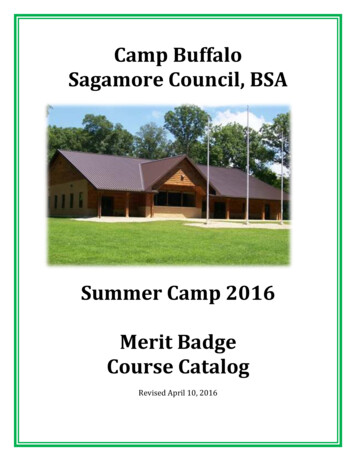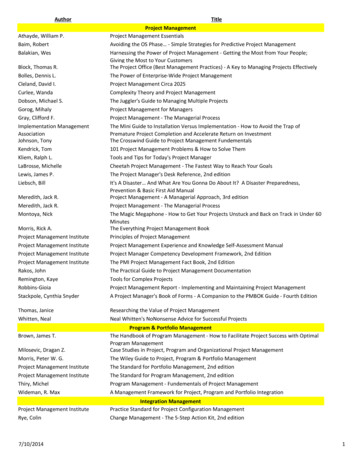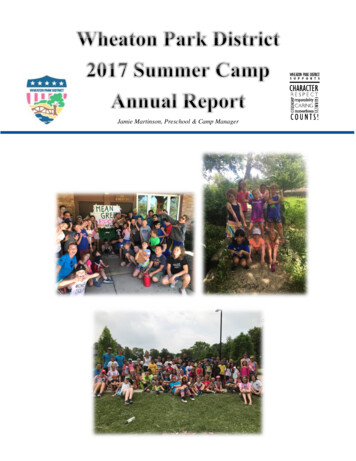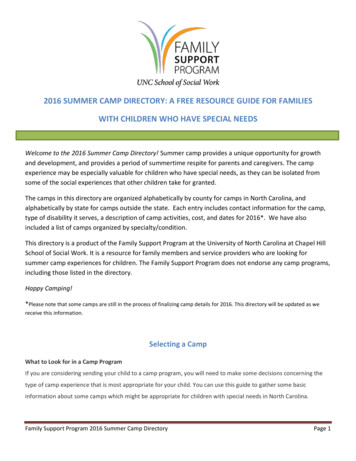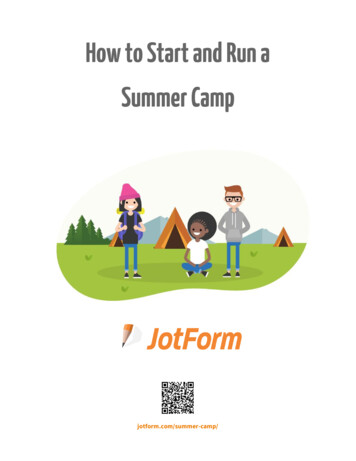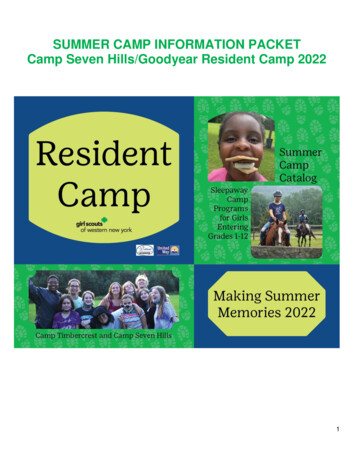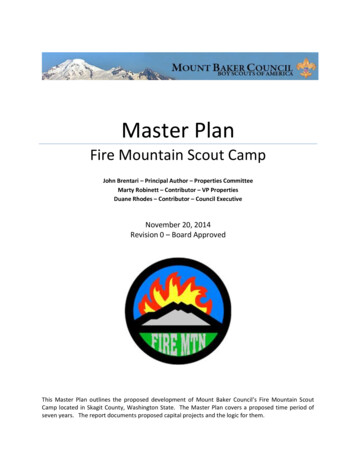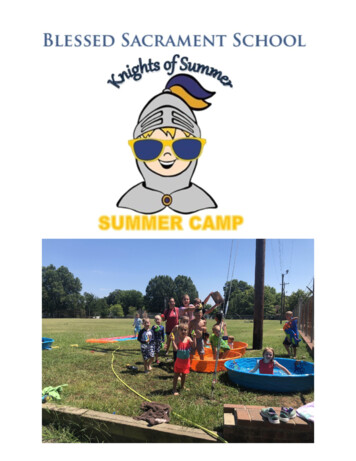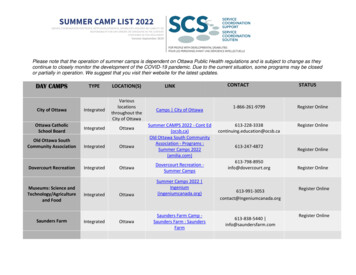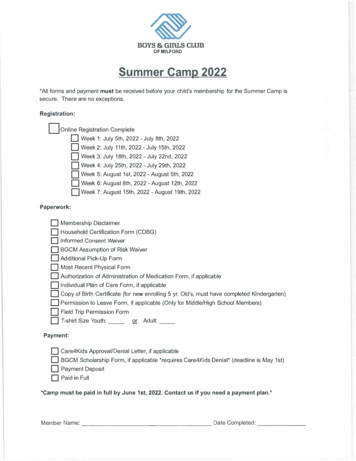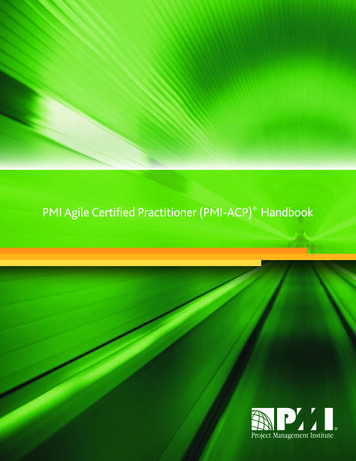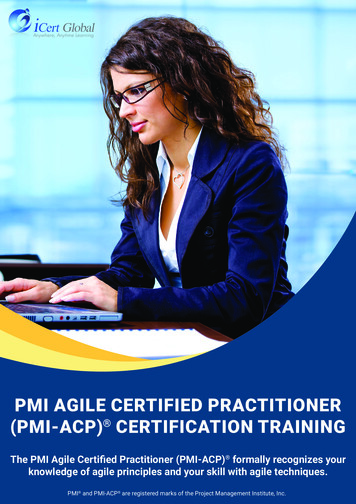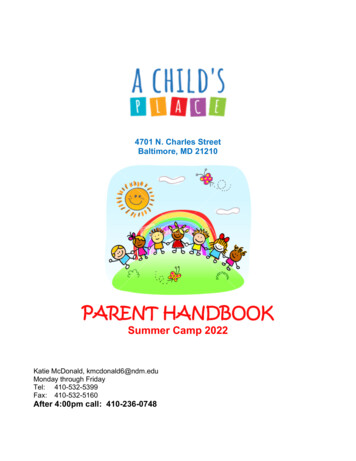
Transcription
4701 N. Charles StreetBaltimore, MD 21210PARENT HANDBOOKSummer Camp 2022Katie McDonald, kmcdonald6@ndm.eduMonday through FridayTel: 410-532-5399Fax: 410-532-5160After 4:00pm call: 410-236-0748
A Child’s PlaceSummer Camp: Policies AcknowledgementThis document signifies that , parent of , has readthe A Child's Place Parent Handbook -- Summer Camp on (date).Please initial that you have read and understand the policies concerning the following:Summer sessions (closed July 4th)Release of Information Waiver (as needed)Age eligibilityToilet training policy (ALL children must be toilet-trained to attend to his/her needsindependently)Nap time for all 3 and 4 year olds (bedding, toys, etc.)Hours of operation; parking; late pick up penalties and feesCamp fees payment schedule and late payment feesDUE DATE of all required enrollment forms, including MD Health Department formsSign-in/and sign-out books; required emergency form; individuals to pick up child; changes incustodyHealth and safety policies; sunscreen and Medication Authorization formSuspected child abuse proceduresTerms of care, i.e., clothing, meals, snacksParent visitationsBehavior, discipline, and bullying policy; terminationChanges to ACP policies and proceduresCOVID addendumYour signature below indicates that you have read the Parent Handbook for ACP Summer Camp2022, found online at the ACP website. Your signature further signifies that you understand thepolicies of A Child’s Place and agree to comply with them.Parent Signature Date1
PHILOSOPHY and GOALS of the SCHOOLA Child's Place provides a diverse and comprehensive program to fulfill the needs of thepreschool children in the community. The early learning curriculum provides each child withopportunities to experience, explore, and learn about the world around him/her. Each childis a unique person with an individual timetable for growth and development. This growth anddevelopment includes physical, cognitive, and social-emotional domains, as well as thechild’s unique personality, learning style, and family background. Both the curriculum andstaff's interaction is responsive to individual strengths, needs, and interests.Children are encouraged to accept one another's differences and are led by example torespect all cultures and customs. Through teacher demonstration of compassion and caring,the children learn to be supportive of individuality. Learning in young children is the result ofinteraction between the child's thoughts and experiences with materials, ideas, and people.These experiences should match the child's abilities, interests, and understanding. This canbest be accomplished in a noncompetitive atmosphere built on a foundation of trustbetween teacher and child and among the children.Teachers use their knowledge of child development to design the most appropriate earlylearning environment for the children in their charge. The content and teaching strategiesare developmentally appropriate, age appropriate, and individually appropriate. Children'simaginative play is a primary avenue for mental growth. Play enables children to progressalong their own individual developmental sequence from the sensorimotor intelligence ofinfancy to pre-operational thought in the preschool years to the concrete operationalthinking exhibited by children in primary grade school.*In order to provide an environment conducive to learning for each child and to meet eachchild’s needs, it is important that parents share information from any early evaluation orassessment that can provide background information to guide us in planning an earlylearning program for your child. Please see the director to obtain a “Release of InformationWaiver” which requires your signature in order for A Child’s Place to receive a copy of yourchild’s Individualized Family Service Plan (IFSP) or Individualized Education Program (IEP).RELIGIOUS AFFILIATIONSA Child's Place serves the greater surrounding community and, therefore, strives to maintainan atmosphere of acceptance of all people, creeds, nationalities and religions. Theclassroom approach is one of education rather than one of endorsement. Notre Dame ofMaryland University, of which A Child’s Place is a part, is a Catholic organization. Whilereligion is not taught as a subject in the preschool summer camp, please be aware that anon-denominational grace is said before meals and snacks.CONTACTParents may contact teachers by email daily. The director may be reached at 410-532-5399or kmcdonald6@ndm.eduTeachers may also be reached through e-mail:Room 1 – dhoward@ndm.edu and Arielle GibsonRoom 3 --Room 2 -- rrihalopex@ndm.eduRoom 4 -- aford@ndm.eduSUMMER SESSIONSSummer camp begins on June 13, 2022 and runs through August 19, 20222
Session One, June 13-24:“Bubbles Balloons and Booms”Session Two, June 27-July 8:“Art-O-Rama”Session Three, July 11-22:“Lets Build It”Session Four, July 25-August 5:“Animal Animals Animal”Session Five, August 8-19:“Bugging Out”Enrollment is based on a first-come first-served basis, with priority given to NDMU faculty, staff,and students. Children already in attendance during the school year who wish to attendcamp during the summer must register for sessions. Online registrations require a 50 depositfor each session you want your child to attend. The deposit is applied to the camp fee and isnon-refundable. Children enrolled in summer camp will be assigned rooms based, primarily,on age.RELEASE OF INFORMATION WAIVERIf your child has an IFSP (Individualized Family Service Plan) or an IEP (Individualized EducationProgram), please sign a “Release of Information Waiver” so that A Child’s Place may receivea copy in order to best meet your child’s needs while attending summer camp.AGE ELIGIBILTYChildren must be at least two years old and fully toilet trained. A Child’s Place is a preschoolsummer camp in an early learning environment, this includes children ages 2-6. Parentsshould consider whether a child who is over age 6 would be best served at A Child’s Place orat Camp Notre Dame (410-532-3584) which serves children ages 5 to 11.TOILETINGChildren must be fully toilet trained before acceptance into the summer camp program.Diapers and disposable "pull-ups" are not permitted. No child will be permitted to remain inthe program if he/she is not toilet trained and able to attend to his/her basic needsindependently (with assistance given on occasion as needed).NAP TIMEAll two, three, and four year old children participate in nap time and are required to rest forquiet time in the Big Room from 1:00-3:00 p.m. daily. Nap time ends at 3:00pm and isfollowed by the afternoon snack. Toys and games are not allowed in the Big Room at naptime with the exception of a stuffed animal or other ‘lovey’ required by the child. Parents areresponsible for providing a sleeping bag and for taking the bedding home every Fridayevening for laundering. These items must be brought back on Monday.HOURS of OPERATIONA Child’s Place Summer Camp hours are 9:00 a.m. to 3:00 p.m., Monday through Friday.Extended care is available at no extra charge, with before care daily from 7:30-9:00 a.m. and3
after care from 3:15-5:20 p.m. There will be a late fee charged for any child who is notpicked up by 5:30 p.m. Please review our Late Fees and Pick Up Policy for more information.In case of emergency when a parent is unavoidably detained, contact us on the school cellphone at 410-236-0748. Your child may not be released to anyone else unless you giveexpress permission to an ACP staff member, preferably in writing.NOTE: ACP summer camp will be closed for the 4th of July holiday.PARKINGThere are only 2 reserved parking spaces for drop-off and pick-up. Parking on campus is verylimited. Please limit your pick-up/drop-off time to no more than 10 minutes. This allows allfamilies the ability to park safely. Campus Safety Officers are very tolerant of the need forACP parents to park in non-parking spaces while dropping off or picking up campers as longas no other car is being blocked in and it is not an emergency access. While Notre Dame ofMaryland University has an excellent reputation for safety, it is not advisable to leave your carunlocked or to leave siblings unattended in the car.DAILY ARRIVAL AND DISMISSALBefore arriving on campus or sitting in your car prior to coming to A Child’s Place, you arerequired to respond to an online assessment of your child’s health by answering questionsregarding your child’s level of exposure to COVID-19 and potential symptoms.Upon arrival, a staff member will take your child’s temperature and show the parent theregistered temperature.Due to COVID-19, paents will not be allowed to enter the school during morning drop off. Allstudents are pre screened for COVID-19 symptoms before entering the building. However,parents are allowed and encouraged to enter the school during afternoon pick up.Arrival Procedures to Address COVID-19: Display the ACP Family ID Card in the front window of your car Adhere to your assigned drop off schedule Use the ACP assigned parking spaces Walk your child to the check in table outside of the preschool A staff member will take your child’s temperature and ask if your child is experiencingany COVID-19 symptoms. You will sign your child in A staff member will escort your child to join their assigned camp group. All adults must wear a face maskDismissal Procedures to Address COVID-19: Display the ACP Family ID Card in the front window of your car Adhere to your assigned drop off schedule Use the ACP assigned parking spaces Campers in rooms one, three, and four will consistently be outside on the playgroundfor pick up, unless the weather is considered dangerous through Office Child CareWatch. This includes heat advisories, wind warnings/watch, tornado warnings/watch,and thunderstorm warnings/watch. If they are not outside on the playground, please4
use the door code to enter the preschool and pick your child up from the bigplayroomDepending on class size, pick up for Room Two may be indoors. If they are not outsideon the playground, please use the door code to enter the preschool and pick yourchild up from the big playroomHelp your child into their car seat and buckle them in.Dismissal ends at 5:20pm. There is a late fee associated with picking up your childafter 5:30pm. Please review late policies and procedures for additional information.All adults must wear a face maskCAMP FEES -- ALL REGISTRATIONS AND PAYMENTS MUST BE MADE ONLINE.The fee for each two-week session is 725 for ages 3-6 and 780 for age 2. There is a nonrefundable 125 deposit due at registration which is applied to the overall cost.Payment in full for each session must be the week before the first day of the session,according to the following schedule:Session I –balance due on or before June 6thSession II –balance due on or before June 20thSession III – balance due on or before July 1stSession IV – balance due on or before July18thSession V – balance due on or before August 1stRegistration for a session requires full payment for the session. Missed or unused days will notbe pro-rated.METHODS of PAYMENTPayment may be made by credit card using our online registration system. There is anadditional fee when using a credit card. Checks can be made to “A Childs Place Preschool;Notre Dame of Maryland University.” Checks must be submitted by the end of the businessday the Monday before the camp session begins. Online checks may be used online.LATE PAYMENTThere will be a late fee of 2.00 per day for any session fee paid after the first day of thesession. If the school has not received your payment by the third day after the session begins,your child's enrollment in the camp may be terminated and his/her space may be offered toanother child.LATE PICK-UP PENALTIES and FEESA child who is late to be picked up often experiences anxiety and discomfort. Therefore it isin all of our best interest to ensure a child is picked up safely and on time. A Child’s Place finalpick up time is 5:20pm Monday through Friday.If you know you will be running late, call the after 4pm phone number for A Child’s PlacePreschool (410) 236-07481st late pick up5:30-5:35pm 0.002nd late pick up2nd late pickup within the 5.00 10.00week5
5:36-5:40pm 0.005:41-5:46pm 0.00Total 0.00 10.00 20.00 35.00 20.00 20.00 50.00 0.00 20.00 20.00Eachadditional 5minutesExact time will be determined by the Eastern Standard Time setting on a cell phone deviceand recorded to the minute upon arrival.A late fee invoice will be issued to you the following morning and the fee will be due whenyour child is picked up that afternoon.If no communication has been made from the child’s immediate contacts by 5:30pm,emergency protocol will come into effect. This entails two teachers calling the child’semergency contact list to schedule alternative pick up for the child.If no communication has been made from the child’s immediate contacts and theiremergency contacts by 6:00pm, campus security is notified and will monitor the child untilthe Baltimore City Police Department/Department of Social Services arrives on scene. This isabsolutely essential for the child’s safety and well being.If you are unavoidably detained due to an emergency, please notify the office (using theACP cell phone 410-236-0748 after 3:30). When you are late, you cause the closing staff tobe late picking up their children. Please note that your lateness has a trickle-down effect that impacts others.If a child has not been picked up by 6:30pm and no communication efforts have beenmade, Campus Safety will call the Baltimore City Police who will contact the Baltimore CityDepartment of Social Services, Child Protective Services. Child Protective Services will cometo the university and pick up your child. When you arrive on campus, go to the desk in thefoyer of Gibbons Hall where you may contact Campus Safety and make arrangements topick up your child.REQUIRED ENROLLMENT FORMS* Forms are available on the Online Registration SystemEach child must have on file, one week before the first day of the session, the following forms:1) Emergency Form**2) Health Inventory**3) Immunization Certificate**4) A Parent’s Guide to Regulated Child Care (MSDE) **5) Medication Authorization Form (required for every child for sunscreen)6) Swimming Pool Permission (5-6 year olds ONLY)7) Policies Acknowledgement (page 2 in the 2022 Summer Camp Parent Handbook)8) COVID Addendum*All forms should be completed and uploaded using our online registration system.**Students currently enrolled at ACP already have some of these forms on file. They will beentered into the online registration system by the ACP Office. New forms are not necessary6
unless changes are to be made. Immunization forms must be updated as students receiveadditional immunizations.SIGN-IN AND SIGN-OUT BOOKSPlease sign your child in when you arrive, and, when you pick up at the end of the day, signyour child out. If someone else is picking up your child at the end of the day, pleasecomplete the “Alternative Pick Up” form during morning drop off.INDIVIDUALS to PICK UP CHILD; CHANGES in CUSTODYThe school can release a child only to the parents or legal guardian of the child, or theindividuals authorized to pick up the child whom the parent/guardian has listed on theEmergency Form provided by the state licensing agency. Staff members of the school mayrequire any person who arrives to pick up a child to show a photo ID. All persons authorizedto pick up a child must be at least eighteen (18) years old. If there is any change in legalcustody of the child while the child is enrolled in the school, the parent must immediatelynotify the school and must provide the School Director with a certified copy of the CourtOrder confirming the change in custody. If an unauthorized person arrives at the school topick up a child, the school staff will notify the parent immediately.RELEASE of CHILD to INTOXICATED or DRUGGED INDIVIDUALIn order to protect the children from any potential danger that could arise because of anindividual's condition, and to protect the school against potential claims, it is the policy of theschool to take all reasonable steps to avoid releasing a child to a person in a drugged orintoxicated state. Accordingly, if, in the opinion of the teacher present at the school, anauthorized person who arrives to transport the child home from the school is in an intoxicatedor drugged condition, the staff member will:a. Notify a parent or guardian of the situation;b. Ask the person to leave his/her car at the school and take the child home usingother means of transportation; and,c. Offer to call another relative, friend or taxi (at the parent's expense) to drive theperson and child home.If the parent or guardian insists on driving the child home, the school's staff member will notifyCampus Security who will notify the local police department. If police officers agree that theparent or authorized person is intoxicated or under the influence of drugs, the parent orauthorized person may be charged with public drunkenness and/or driving while under theinfluence. If any parent or guardian frequently arrives in an intoxicated or drugged state, theschool will not only notify the police department, but also will alert other appropriategovernment authorities involved with the care and treatment of children.HEALTH and SAFETY POLICIESIllness: Please call the school (410-532-5399) or email (kmcdonald6@ndm.edu ) or if your childis absent.If your child has any symptoms, do not bring them to camp. A healthy child can activelyparticipate in all activities. You know your child best. If your child is not feeling up to a full,active day of camp-please keep them home.7
A child with a fever of 100.4 or more will be sent home. The school reserves the right toterminate the contract if your child is consistently brought to camp sick. Please refer to theCOVID Addendum for specifics regarding daily health policies.Allergies:All allergies, whether medical, food, or insect, and the medical interventionnecessary, must be detailed in a written report outlining the allergy and medicalprocedure to follow, i.e., Asthma Action Plan, Allergy Action Plan, etc. This form mustbe kept on file in the school office.Chicken Pox:Two days without fresh lesions and signs that other lesions have dried up arenecessary before returning to school.Rash:Children with a rash present will need a doctor’s note confirming the rash is notcontagious prior to coming to camp.Conjunctivitis or Pink Eye:Must be treated by prescription medicine and diagnosed by a physician. Child mustremain home for 24 hours after start of medication.Diarrhea and Vomiting:Diarrhea and/or vomiting associated with illness will be cause for a child to bedismissed for the day. They may not return for at least 24 hours after symptoms havesubsided.Fever:A temperature of 100.4 degrees (axillary) is considered a fever. The child may notreturn to school until 24 hours after they have been free of a fever without feverreducing medication.Fifth Disease:Contagious before pink cheeks appear. The child need not stay home unless othersymptoms, such as fever, are also present. Parents will be notified if it is present in theschool. Pregnant women need to contact their physician and follow his advice.Head Lice:Child must be treated and lice free for at least 24 hours.HIV or AIDS:We can neither deny nor confirm the presence of anyone who is HIV positive or whohas AIDS.Strep Throat:Child must be on antibiotics for 24 hours.Administration of Medication: ACP’s personnel cannot administer any medication includingover-the-counter medicine such as aspirin, cough drops, decongestant, or other nonprescription drugs, as well as prescription medicine to a child unless the school has aMedication Authorization Form signed by the doctor and the parent.Sunscreen: Parents must submit a signed Medication Authorization Form for the use ofsunscreen which is strongly recommended. Apply sunscreen at home in the morning, andstaff will assist your child to reapply sunscreen later in the day. Send an upopened lotion or8
stick of sunscreen, labeled with your child’s name, to the classroom teacher with the signedform. Please do NOT send sunscreen in a spray form.Emergencies: If a child is injured or becomes seriously ill while at the school, every effort willbe made to contact the parent. It is critical for each parent to complete the EmergencyForm so that the school can contact the parent or other authorized person in an emergencyand have the child treated if necessary. The parent must notify the school if there is anychange in the emergency contact information. Sick or injured children are expected to bepicked up within the hour.Medical Examination: The State of Maryland Department of Human Resources requires thatno child under 6 years of age shall be admitted to a day nursery (or other early care andeducation program) until he has been given a complete physical appraisal. The appraisalhas to be completed within no more than twelve months prior to the child's admission to apreschool or child care program.PROCEDURES for SUSPECTED CHILD ABUSE CASESThe school is required by law to report evidence or suspicion of child abuse or neglect.Persons found guilty of failure to report abuse are subject to a fine.CLOTHINGTwo (2) complete changes of clothing must be available. If it is necessary for your child touse his/her change of clothing, you must replace those articles of clothing the next day. If itis necessary to use emergency clothing items belonging to ACP, please launder and returnthem the next day so that they will be available for other children’s use as needed. Pleasealso provide additional face masks for your child.For Outdoor Play:Since we use the playground daily during summer camp, we ask that all students pleaseadhere to ACP safety rules regarding footwear: NO open-toed sandals, NO wedges, NO flipflops, NO Crocs. Typical 'tennis shoes" or other athletic-type shoes with closed toes are bestsuited for outdoor play. Socks are also necessary to prevent blisters. No sunglasses, please.Dress for the Weather:While summer days are usually warm, sunny and humid. Since we begin the day on theplayground, please be sure that your child is dressed accordingly. Jackets and light sweaterscan easily be removed as the morning warms up. Always apply sun screen to your childbefore they come to camp each day, include their ears and the back of their neck.MEALS AND SNACKSA Child’s Place provides a healthy morning and afternoon snack each day. We serve milk orwater to the children with both snacks as well as at lunch time. In accordance to MarylandOffice of Child Care policies, no sugary drinks may be served-including beverages packedfrom home in a lunch box. Most families opt out of packing a beverage with lunch sincewater and milk is provided by staff at this time. Parents are responsible for providing lunch fortheir child, whether packing a lunch box from home or purchasing through the LunchProgram. Lunches will be refrigerated, but ACP does not have facilities to heat lunches. Werequest that food, candy, gum, etc. not be brought to the school. No juice boxes arepermitted. Snack menus are posted in the foyer/entrance hall on the Parent InformationBoard.9
It is critical that parents advise your child’s teachers and the ACP office of any food allergies.Substitute items may be provided by the parent, e.g., soy milk. ACP reserves the right toidentify as a ‘nut-free’ environment if a student or students are reported as having healthrelated issues. Clear communication with ACP parents explaining preventative measures willtake place if/when such an action is required based on current enrollment.BEHAVIOR, DISCIPLINE, and BULLYING POLICYAt A Child's Place we strive for the ideal that the child commands his/her own self-disciplinethrough self-control. Our rules and regulations are based on health and safety and thosecommon courtesies useful in dealing with a group. If a child is out of control, he/she isreminded to use words to handle his/her problems, or he/she may be asked to take a short"time out" from the situation until he/she is calmer and can handle the situation in a moresocially acceptable manner.The purpose of discipline is to teach the child correct behaviors, not to punish misbehavior.Positive reinforcement and redirecting the child's behavior are two other ways to discipline achild. Staff members also act as role models, demonstrating socially acceptable mannersand courtesies. Discipline must always be accompanied by demonstrating the expectedappropriate behaviors and by a verbal explanation of how to behave the next time a similarsituation arises. Role playing is a useful tool to help young children recognize acceptableand unacceptable behaviors.The teaching staff primarily uses logical and natural consequences to teach the children selfcontrol. Natural consequences are the result of going against the laws of nature, i.e., thechild who refuses to eat lunch gets hungry. Natural consequences don't need anyinterference from adults, for example, when you don’t wear gloves, your hands get cold.Logical consequences are the result of going against the rules of social cooperation, e.g., ifthree-year-old Brad deliberately rides his tricycle into Kristen, Kristen may not want to playwith him, or an adult may take away Brad's tricycle-riding privileges for a while. Logicalconsequences meet the needs of a particular situation. They have the following qualities: 1)they express the rules of social living; 2) they are related to the misbehavior; 3) they separatethe deed from the doer; 4) they are concerned with what will happen now; 5) they are givenin a friendly and supportive manner; and 6) they permit choice.What is bullying?There is a difference between play, which builds imagination, develops coordination, andteaches children about rules and responsibility, and bullying, which is chronic, frequentbehavior that has, at its core, the intention to harm and intimidate. The most obvious formsof bullying are repeated hitting, shoving, chasing, or threatening. Other forms include namecalling, teasing, telling lies, and excluding. Bullying also includes taking or destroying anotherchild’s belongings. Bullying is very different from occasional roughhousing or behaviorproblems under usual circumstances. It is repeated roughness or repeated plannedvictimization. The intention of bullying is to cause deliberate hurt, physical or emotional, or togain more power or control. Bullying usually occurs consistently between the same children.10
While people mistakenly believe that bullying begins later in elementary school,unfortunately, it may also occur as early as the preschool years. Emergent bullying behavioris sometimes overlooked by parents and caregivers and deemed normal socialexperimentation. However, when a child believes that conflict is best resolved using threatsor force, when he/she deliberately and systematically finds ways to inflict injury or harm,physically or emotionally, to their victim, and maybe even laugh after doing so, adults mustindeed be concerned. Minimizing the importance of the issue sends a message to a childthat being inconsiderate of other people’s feelings is acceptable. Victims of bullyingbecome shy, isolated, and fearful. The bully learns a false sense of his/her own importanceand power and sets him/herself up for social failure.At A Child’s Place, the children’s emotional and physical safety and well-being will always bethe primary concern. ACP staff members are in a position to prevent conflict or take steps toreduce the likelihood of problems. While we want and encourage children to use their wordsto resolve their own conflicts, it is important to keep a reasonable standard of behavior inmind. Staff members demonstrate the behavior we want the children to imitate andemphasize that bullying is not acceptable. Staff members explain in simple language thatbullying behaviors actually hurt others. It not only hurts the victim, but also the child doingthe bullying – other children don’t want to be friends with someone who bullies them.Our goal at A Child’s Place is to teach, not punish. Children who learn how to resolveconflicts, respect others, and handle frustration will refrain from bullying behavior.PLEASE NOTEThe school may terminate your child's enrollment in summer camp, effective immediately, ifany of the following conditions arise:In the judgment of the preschool director and staff, the child's behavior threatens thephysical or mental health or well being of other children in the school; i.e. throwingobjects, extreme temper tantrums, destroying school property, destroying personalproperty, fighting, hitting, biting, bullying.TERMINATION by SCHOOL1. Immediate: The school may terminate your child's enrollment in the summer campeffective immediately, if any of the following conditions arise:a. In the judgment of the school director and staff, the child's behavior threatens thephysical or mental health or well being of other children in the school; in the judgmentof the director, the child's behavior threatens the physical or mental health of the staffin the school;b. A parent's behavior is inappropriate;c. The child is brought to the school ill more than three (3) times within any 30-dayperiod; or the parent fails to promptly pick up a sick child more than three (3) timeswithin any 30-day period.d. Late evening pick up three (3) times during a session.If enrollment is terminated, you will receive a portion of the session fee, pro-rated on a dailybasis for the period remaining in the session.2. Two-weeks Notice: The school may terminate your child's enrollment upon two (2) weekswritten notice to you if any of the following conditions arise:1. Any o
Notre Dame of Maryland University, of which A Child's Place is a part, is a Catholic organization. While religion is not taught as a subject in the preschool summer camp, please be aware that a . additional fee when using a credit card. Checks can be made to "A Childs Place Preschool; Notre Dame of Maryland University." Checks must be .
